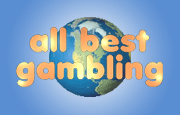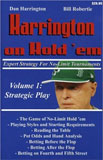381 pages
List Price: $29.95
Buy new: $19.77
Save: $10.18 (34%) |
Harrington on Hold 'em: Expert Strategy for No Limit Tournaments (Strategic Play)
by Dan Harrington, Bill Robertie
Spotlight Reviews
Top notch; very pleasantly surprised, February 15, 2005
Reviewer: M. Grapenthien (Chicago)
No limit hold'em, obviously, is a complex game. So complex that there has never been a good comprehensive treatment in a book form; I had thought that this was because it involves more "table feel", experience and intuition that can't be easily taught or expressed in a useful format.
Harrington and Robertie have done just that. Harrington is the 1995 world champion, and the only player to make the final table in both 2003 and 2004, overcoming the two biggest fields in World Series history (839 and 2,576 players, respectively). Robertie is a top backgammon player and author of several excellent books on that game.
Among the top players, there are drastically different styles of play, from conservative to super-aggressive. One problem I expected was that given Harrington's solid, fairly conservative style, he wouldn't be able to give much useful information on playing at the other end of the end of the spectrum, styles such as those employed by Daniel Negreanu and Gus Hansen.
I was wrong. The book does a fine job addressing the relative merits of various styles, playing against each type of opponent, and even choosing one for yourself. This makes sense; no matter his own style, to be successful he has to have spent a lot of time thinking about, observing, and combatting all different types of players. Further, a playing style isn't cast in stone; even the most conservative players have to switch gears and become much more aggressive at times, and vice versa.
A few more notes on this idea: first, Harrington's own play as described isn't as conservative and cautious as many think. Second, a fairly conservative approach is demonstrably the more sound one for the student, and anyone without many years of experience. Hyper-aggressive play would be much harder to teach well, and also much harder to pull off successfully. The players who thrive playing these aggressive, gambling styles have exceptional talent as well as lots of experience and a great feel for the game and their opponents, and are faced with difficult decisions under lots of pressure much more often. For those who insist on trying, it probably still makes more sense to learn a fundamentally sounder style first and then proceed from there.
The book is laid out well for learning. Each chapter starts with a discussion of the topic, touching on the theory. There are several example situations with the authors' answers and detailed reasoning, as well as the merits of alternative plays. Following each chapter there are problems, mostly from real hands. It provides a diagram of the table, the chip counts for each player, your knowledge of the opponents, etc... all the relevant information. The problems usually provide all this information even when some of it is irrelevant to the problem, which is a strength. A big part of the decision-making process in poker (as well as lots of other things) is recognizing and eliminating extraneous details to make analysis more managable.
This is the first in a two volume set. I thought this was odd, as this is first for 2+2 poker books, but the first volume is bigger than most of their others already. The book is self-contained; there are no partial answers or information that tell you to buy the second volume for the details. I don't think there has been an official announcement on when Volume 2 will be released, but I've heard sometime this spring.
The book is geared specifically toward tournaments, and especially toward those with well-defined formats, such as major casino/cardroom events and those on the Internet. For cash game players, a solid understanding of tournament and poker theory would be necessary to make the appropriate adjustments to cash play. Most of the book would still apply, but some situations would change drastically in a side game, where simply getting your money in with an advantage, rather than survival, is the main goal.
For those newer to poker, to get the most out of this book, I would recommend a few others be read either first or at the same time: "The Theory of Poker" by David Sklansky, "Small Stakes Hold'em" by Miller, Sklansky and Malmuth, and "Winning Low Limit HOld'em" by Lee Jones, especially for the newest players.


|



